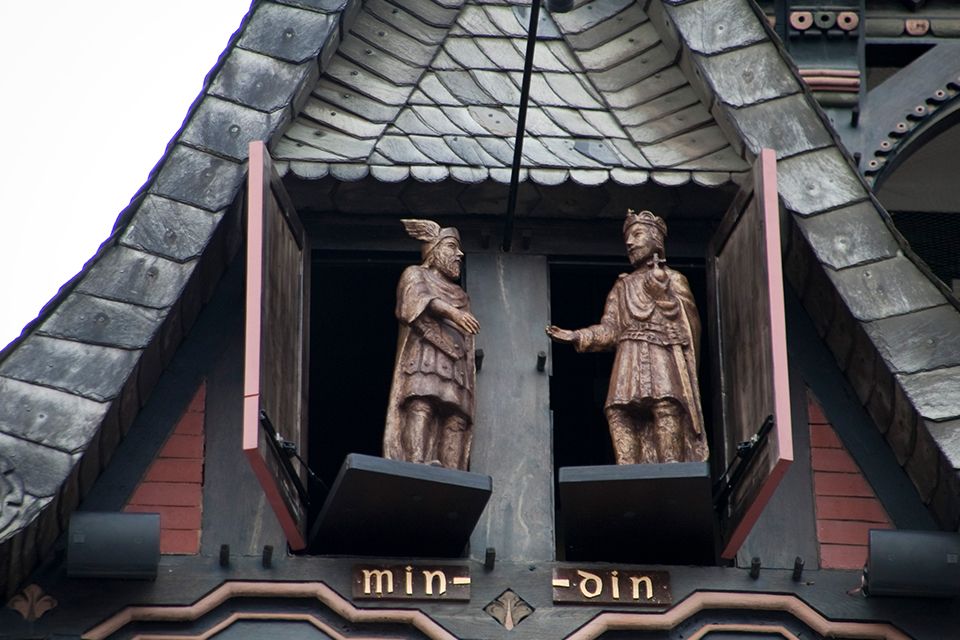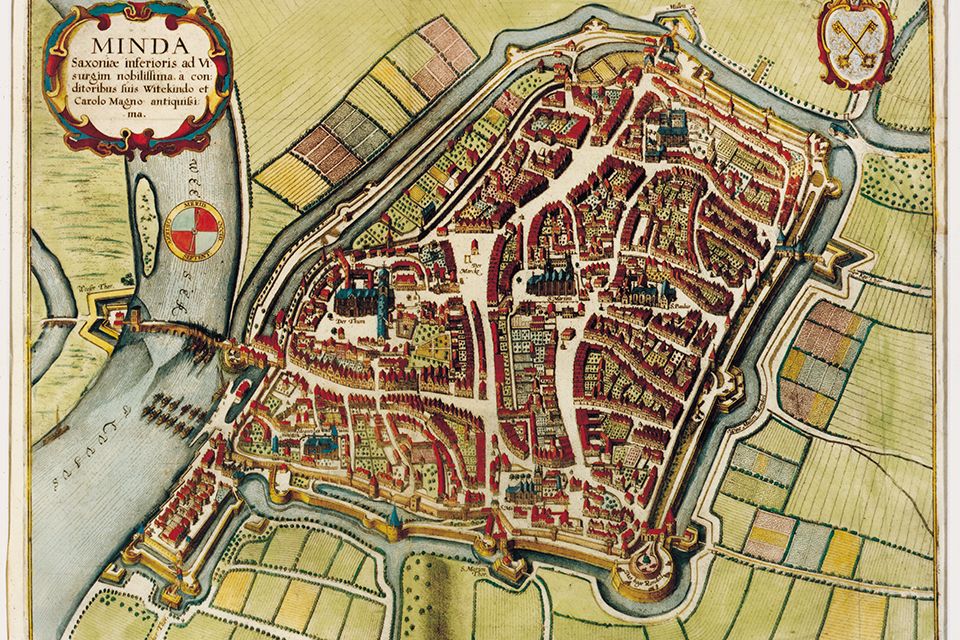
min+din - Minden's foundation legend
The pagan Saxons were fighting against the conquest and the Christianization of the king of the Franks Charlemagne in the 8th century. On the Wiehen Hills the rival chieftain converted to Christianity because of the so called "Quellwunder".
A peace treaty was signed in his castle at the banks of the river Weser and it was then declared "This castle shall from henceforth on be "min" (mine) and "din" (yours)." That's how "Minden" got it's name.

Once upon a time in 798...
... when Charlemagne (Karl der Große) called for an assembly in Minden. Recorded in the Franconian annals, this is the first official mention of Minden and marks the beginning of more than 1200 years of history. In the year 800 Minden got a bishop and its first cathedral.
By 977 Minden enjoyed many privileges including the right to coin money, hold markets, raise customs and to establish a legal court. These laid the foundations for the further development of the town.
The large market place in front of the town hall shows that Minden attracted merchants and craftsmen. In the Middle Ages Minden was part of the Hanseatic League, an extensive federation of trading towns and guilds. These ties to other commercial towns helped Minden to grow and flourish and eventually extensions of the town became necessary.
In Minden an economic boom followed the Reformation. Today you can still find traces of the architecture of that time in the town. There are also quite a few buildings which remind you of the years under Brandenburg-Prussian rule. See the sights and stroll through the centuries!

Minda in the 17th century
The historical map according to a copper engraving by Wenzel Hollar gives an impression of what Minden looked like in the middle of the 17th century. Since then some constructional modifications took place, which did not change the basic structure in a significant way though: Two churches (St. Johannis and St. Paulus) have been abandoned, the estuary of the 'Bastau' has been displaced to the 'Weser', a row of houses between the 'Scharn' and the former Hohn-Street as well as the inner city gardens have vanished.
Minden Wissenswert: Historische Daten
798
First written mention of Minden in the Franconian Imperial Annals
c. 800
Charlemagne founds the diocese of Minden
977
Kaiser Otto II awards Bishop Milo of Minden market, coining and tax rights
c. 1230
Minden’s citizens and their council begin trading independently of the bishop, their town and county sovereign
1530
The council decrees a Protestant Church Order
1552
Minden receives the right to free shipping on the River Weser from Kaiser Karl V
1627
Kaiser Ferdinand II awards the town „Stapelrecht” (storage rights): every transport of grain and timber on the Weser has to stop in Minden, where the goods are then offered for sale
1634
During the 30 Years War, Swedish troops occupy Minden and stay until 1650. Prior to this, the town had been occupied by imperial troops since 1625
1648
As part of the Peace of Westphalia, the town and cathedral chapter are awarded to the Elector of Brandenburg
1723
Minden becomes a Prussian administrative centre for the provinces Minden, Ravensberg, Tecklenburg and Lingen
1759
At the Battle of Minden, Duke Ferdinand of Brunswick leads a coalition army (England, Hanover, Brunswick, Schaumburg-Lippe and Prussia) to victory over French and Saxon troops
1806
Minden is occupied by French troops and awarded to the Kingdom of Westphalia
1810
Minden belongs to the French Empire
1813
Minden is recaptured by Prussian troops and receives fortifications
1816
Establishment of the Prussian administrative district of Minden
1847
Opening of the Cologne-Minden railway
1873
The town’s fortified defences are abolished
1915/16
The Mittelland Canal and its crossing point with the River Weser connect Minden with Germany’s inland navigation system
1938
Minden’s synagogue is destroyed during the so-called Pogrom Night
1943 – 1945
Air raids destroy parts of Minden’s Old Town, including the cathedral and town hall
1947
The district administrative centre is moved from Minden to Detmold
1973
Municipality reform: with the addition of 13 boroughs and 4 communities, Minden’s population swells from 54,000 to 85,000
1998
Celebrations ”1200 Years Minden”
2009
Celebrations ”250th Anniversary Battle of Minden”
2016
Digital Minden
2018
850th anniversary of "Mindener Fürstenhochzeit", the marriage between Henry the Lion and Matilda of Saxony that took place in the cathedral of Minden

Minden Marketing GmbH
Kleiner Domhof 17
32423 Minden
Phone: +49 (0)571 8290659
info@mindenmarketing.de
www.mindenmarketing.de
Opening hours of the tourist information office:
Monday - Friday 8.00am - 6.00pm
Saturday 10.00am - 2.00pm


